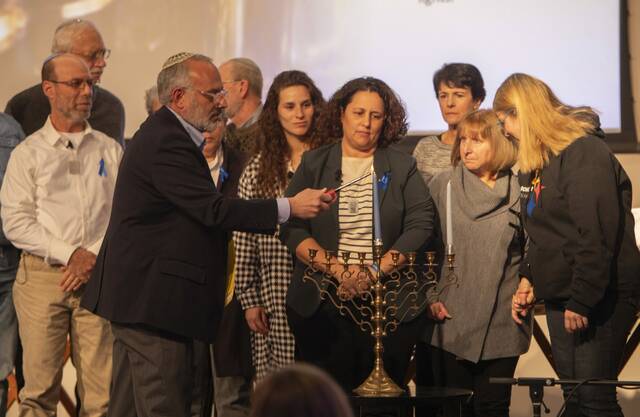https://development.triblive.com/local/8-seconds-to-get-to-shelter-hamas-attack-survivors-share-their-stories-in-squirrel-hill/
‘8 seconds to get to shelter’: Hamas attack survivors share their stories in Squirrel Hill

Shani Teshuva always felt safe in kibbutz Zikim, along the beach in Southern Israel, just north of Gaza.
On Oct. 7, she planned to ride her bike, as she often did on Saturdays. But she allowed herself 10 extra minutes to leave her home.
“Those extra 10 minutes are the reason I’m sitting here today alive,” said Teshuva. “At 6:29, rockets started flying — dozens every second. We had eight seconds to get to shelter.”
Teshuva ran with her husband and two children to the family’s safe room. The parents shielded their teenage kids with their bodies.
A cyberattack had cut all communication in those early morning hours. Teshuva’s husband was tasked with running from house to house to warn people to stay put, that this was different — the community had gotten so used to rocket fire that sometimes people would feel OK leaving their homes, she noted.
Teshuva was one of four survivors of the Hamas attack in October who shared their experiences Thursday with an audience at the Jewish Community Center in Squirrel Hill. The JCC and the Jewish Federation of Greater Pittsburgh worked together on the event, which was made possible through the Jewish Community Center Association of North American and the Israel Ministry for Diaspora Affairs and Combating Antisemitism.
On the first night of Hanukkah, the survivors were part of a group to light the first candle on the menorah.
The group of four were among 20 such groups speaking Thursday at Jewish Community Centers around the world.
One seat on the dais remained empty in honor of the hostages that were taken and not returned home.
For Teshuva’s family, they got out safely.
“Only later did we learn how many miracles we had,” Teshuva said. “Each and every one of us is here alive because we had our own individual miracles and our communities had miracles that kept us alive.”
Before the event, Jeff Finkelstein, president and CEO of the Jewish Federation of Greater Pittsburgh, noted the pain of Squirrel Hill being the site of the shooting at Tree of Life, the worst antisemitic attack in the United States.
“We understand the pain of when Jews are targeted,” Finkelstein said. “But Pittsburgh is also a really special community. And the fact that we were chosen as one of the first 20 (communities to host survivors) really talks about how cohesive a community we are.”
Hila Fakliro was a bartender during an all-night music festival in Israel when the attack started on Oct. 7. Fakliro hid in a ditch, sending text messages to her brother and friends. She joined a group that was fleeing the violence and eventually reached Moshav Patish, a town in southern Israel.
Two of her friends were taken hostage in Gaza, and three others were killed.
“Thank you for coming to hear me,” Fakliro said. “It’s good to know that I’m not alone.”
Teshuva said as the Jewish community observes Hanukkah, the Festival of Lights, it’s critical to be a light in dark places.
“Even a small light shining makes a big difference,” Teshuva said. “Let us shine a light. Each and every one of us can make a difference by being kinder to one another.
“Let’s remember that we’re all brothers and sisters. If we shine all these little lights, we will have a great light in the end. We’re alive, and I am grateful for that.
“But we have a long way to go.”
Copyright ©2026— Trib Total Media, LLC (TribLIVE.com)
